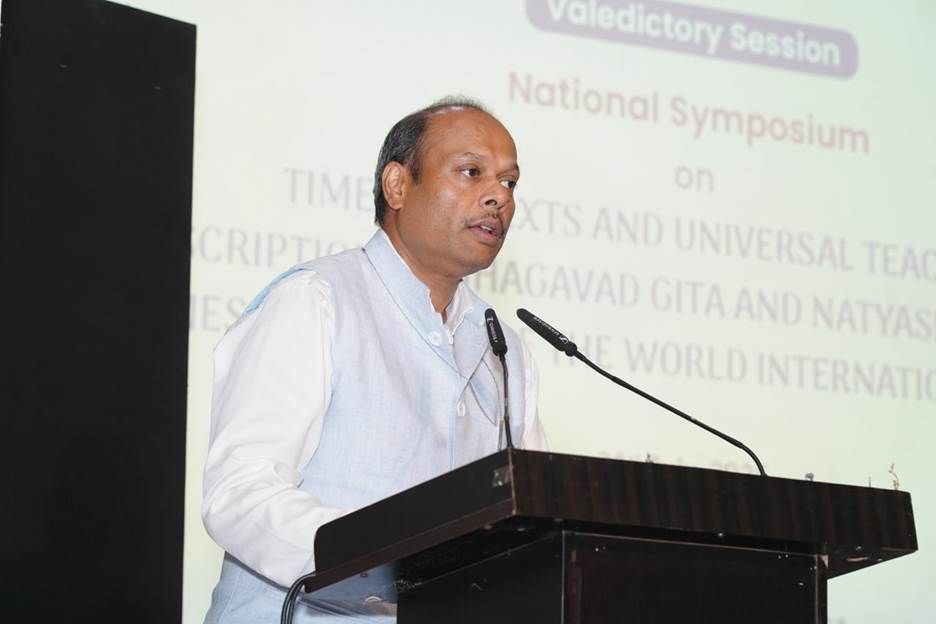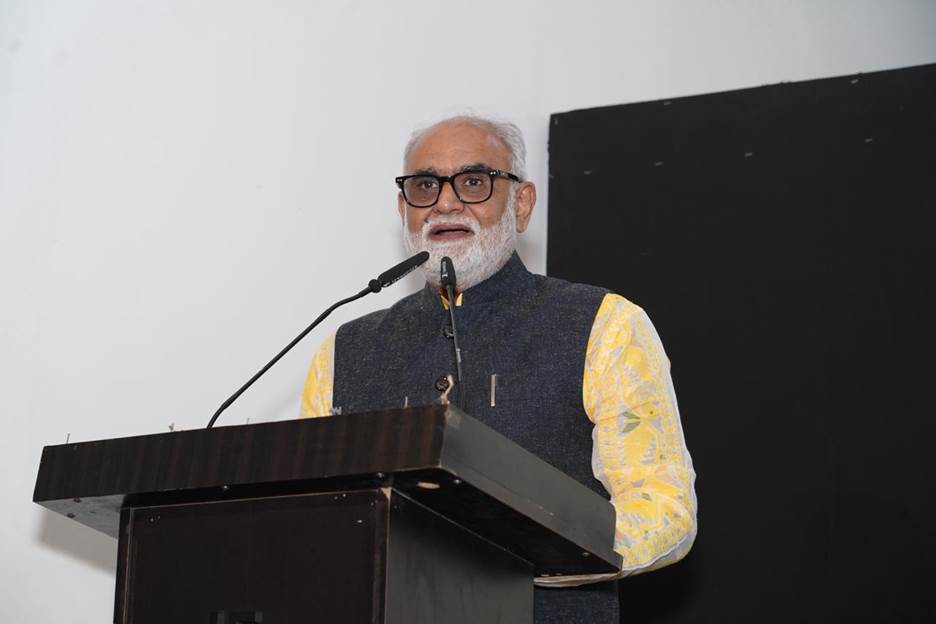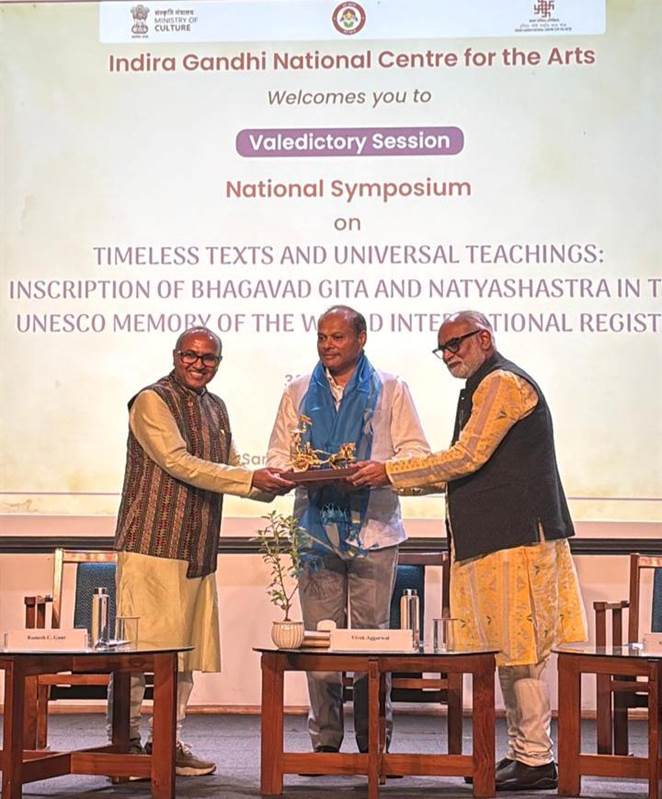“Preserving Manuscript Knowledge and Cultural Heritage Must Be a Collective National Effort” – Culture Secretary Vivek Agarwal
“Preserving Manuscript Knowledge and Cultural Heritage Must Be a Collective National Effort” – Culture Secretary Vivek Agarwal
The two-day national seminar organised by the Indira Gandhi National Centre for the Arts (IGNCA) on the theme ‘Inscription of the Bhagavad Gita and Natya Shastra in UNESCO’s Memory of the World International Register’ concluded on Thursday evening. The valedictory session took place at the Samvet Auditorium, IGNCA, New Delhi, with Shri Vivek Agarwal, Secretary, Ministry of Culture, Government of India, as the Chief Guest, and Dr. Sachchidanand Joshi, Member Secretary, IGNCA, presiding over the session. Prof. Ramesh Chandra Gaur, Dean (Administration) and Head of the Kala Nidhi Division at IGNCA, delivered the welcome address and presented a summary of the discussions held during the two-day seminar.

On the second day, scholars, academics, and cultural experts engaged in in-depth discussions across four sessions, each focusing on critical aspects of the Bhagavad Gita and Natya Shastra. The first session revolved around ‘The Bhagavad Gita in Thought and Practice: The Concept of Dharma and Duty in the Bhagavad Gita and its Relevance across Eras.’ The second and fourth sessions focused on the current relevance and impact of inclusion in UNESCO’s Memory of the World Register. The third session offered a comprehensive exploration of ‘Art, Expression and Knowledge: The Enduring Influence of the Natyashastra.’ Throughout all sessions, eminent speakers appreciated the ongoing efforts to bring global recognition to the intellectual and artistic traditions embodied in the Bhagavad Gita and the Natya Shastra.

Shri Vivek Agarwal, Secretary, Ministry of Culture, stated that the inscription of the Bhagavad Gita and Natya Shastra in UNESCO’s Memory of the World Register is a moment of national pride. Coinciding with the launch of the Gyan Bharatam Mission on Manuscripts, the initiative aims not only at preserving but actively disseminating India’s manuscript knowledge to scholars, students, and the wider public. He emphasised plans to build a nationwide network of institutions and individuals for information-sharing, capacity-building, and sustainable funding of manuscript repositories, including private trusts and religious institutions. He underlined the need to decipher ancient scripts and bridge historical gaps using advanced technologies such as Artificial Intelligence and machine learning. To support future UNESCO nominations, he shared that a proposal has been made for a National Register of unique manuscripts and documents, with the IGNCA envisioned as the institutional anchor for this initiative. He also highlighted the importance of integrating allied efforts-such as epigraphy and rare visual archives-into this broader documentary heritage framework.

Reflecting on his own tenure, he described his experience at the Ministry of Culture as deeply transformative, offering opportunities for meaningful engagement with India’s rich artistic and intellectual traditions. Citing the return of the Piprahwa relics to India as a landmark achievement, he described it as an exemplary case of public-private partnership. The Piprahwa relics-comprising fragments of Lord Buddha’s remains, crystal reliquaries, gold ornaments, and other votive offerings-were traditionally enshrined in a stupa in keeping with Buddhist custom. These sacred objects had been discovered in 1898 during the excavation of the Piprahwa stupa in present-day Uttar Pradesh by British officer William Claxton Peppe. He called for a collective national effort to preserve, promote, and celebrate Bharat’s enduring cultural and civilisational strength.
Dr. Sachchidanand Joshi praised Shri Vivek Agarwal, Secretary, Ministry of Culture, for his dynamic leadership and crucial role in the return of the Piprahwa relics, calling him a ‘doer’ who brings fresh energy to the Ministry. He highlighted IGNCA’s growing responsibility in preparing UNESCO Memory of the World nominations, noting that the recent dossiers were compiled entirely in-house and that IGNCA is emerging as a capacity-building resource, having hosted an international workshop with participants from six countries. He expressed gratitude to the Ministry for entrusting IGNCA with the upcoming international conference on the Gyan Bharatam Mission in September at Bharat Mandapam. Dr. Joshi reiterated the need for a National Register of inscriptions and manuscripts to support future UNESCO nominations and mentioned ongoing projects, including the full documentation of the Uttiramerur inscriptions and tracing the original Sharada manuscript of Rajatarangini. Despite infrastructural challenges, he affirmed the commitment of IGNCA’s young scholars to excellence and thanked all participants for their active engagement in the seminar.
Prof. Ramesh Chandra Gaur welcomed Shri Vivek Agarwal, Secretary, Ministry of Culture, to the valedictory session commemorating the inscription of Shrimad Bhagavad Gita and Natya Shastra into UNESCO’s Memory of the World Register. He noted IGNCA’s pivotal role in preparing the nominations in-house and its emergence as a centre for capacity-building, having recently hosted an international workshop with participants from six countries. He announced that IGNCA is preparing seven new dossiers-four for the International Register, including Valmiki Ramayana, Thirukkural, Ashokan Inscriptions (in collaboration with Nepal), and a joint nomination with Hungary on Hungarian artists Elizabeth Brunner and Elizabeth Sass Brunner, whose paintings-many depicting Mahatma Gandhi and Rabindranath Tagore-form a significant part of India’s cultural archive. Three nominations are also underway for the Regional Register, alongside a proposal to establish a National Register of Documentary Heritage. He expressed gratitude to the Ministry for entrusting IGNCA with the upcoming Gyan Bharatam international conference and reiterated IGNCA’s commitment to expanding public engagement through similar initiatives across India.
The panel on the Bhagavad Gita was chaired by Prof. Shashi Prabha Kumar, with speakers Prof. Om Nath Bimali, Prof. Rajnish Kumar Mishra, and Prof. (Dr.) Sampadanand Mishra, and was moderated by Prof. (Dr.) Ramesh C. Gaur. The following session was chaired by Prof. (Dr.) Rajendrakumar Anayath and Shri K. Siva Prasad, with Ms. Neera Misra as the speaker and Prof. Sudhir Kumar Lall as the moderator. The third session featured Prof. Bharat Gupt as chair, with speakers Prof. Kripa Shanker Chaubey, Prof. Piyal Bhattacharya, and Dr. Shreenand Bapat, and was moderated by Dr. Yogesh Sharma. The final session was chaired by Dr. Sandhya Purecha, with speakers Prof. Biplab Loh Chowdhury, Dr. Rama Kant Pandey, and Shri Chittaranjan Tripathy, and was moderated by Dr. Mayank Shekhar.
The symposium marked not only a significant step towards securing global recognition for India’s classical intellectual tradition but also inspired young scholars and researchers to reconnect with their cultural roots.
****